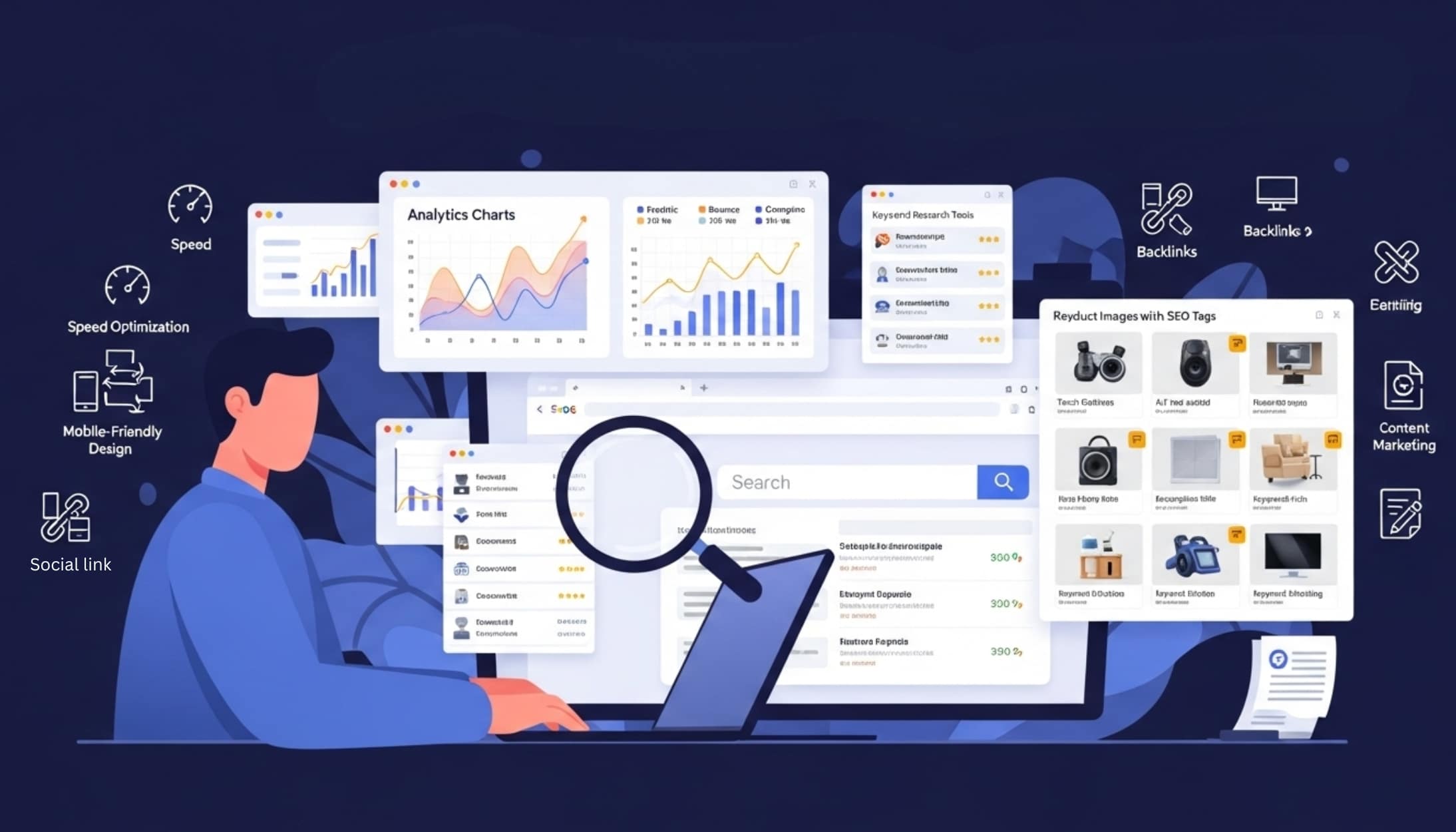What is an Automated Business?
Automated businesses use technology to handle repetitive tasks, manage operations, and interact with customers without constant human supervision. This can involve software, artificial intelligence, robotics, and other tech tools to streamline and optimize business processes.
Imagine you have a business where most of the routine work happens on autopilot. You don’t need to be there every minute because you’ve set up systems that take care of tasks for you. This is the essence of an automated business. Instead of manually processing orders or sending out marketing emails, automated tools do it for you, freeing up your time to focus on growing your business.
Examples of Automation in Business
- Ecommerce Platforms: Think about automated inventory management, order processing, and customer service chatbots.
- Marketing Automation: Tools like email marketing platforms that send scheduled emails, manage subscriber lists, and track campaign performance.
- Customer Relationship Management (CRM) Systems: Automate sales tracking, customer follow-ups, and data management.
- Accounting Software: Automates invoicing, expense tracking, and financial reporting.
Benefits of Automation
- Increased Efficiency
Automation cuts down the time needed to complete tasks, eliminating bottlenecks and ensuring consistent performance. This means higher productivity and getting more done with fewer resources.
- Reduced Costs
By automating repetitive and time-consuming tasks, you can significantly reduce labor costs. Plus, automation minimizes human errors, leading to cost savings in error correction and increased accuracy in operations.
- Scalability
Automated systems can handle increased workloads without requiring more resources. This scalability lets your business grow quickly without needing a lot more infrastructure or personnel.
- 24/7 Operations
Automation means your business can run continuously without interruption. Automated systems perform tasks and provide services around the clock, improving customer satisfaction and potentially increasing revenue.
- Focus on Core Activities
With routine tasks handled by automated systems, you and your team can focus on more strategic and creative activities that drive growth and innovation. This shift can lead to new product development, better customer experiences, and a stronger competitive edge.
Examples of Automation in Business
Ecommerce Platforms
- Automated Inventory Management
Inventory management software can track stock levels in real-time, automatically reorder products when inventory runs low, and update inventory across multiple sales channels. This ensures businesses maintain optimal stock levels, preventing both overstocking and stockouts.
- Order Processing
Automation tools can handle the entire order fulfillment process, from receiving an order to shipping it out. This includes processing payments, generating shipping labels, updating order statuses, and notifying customers about their order progress.
- Customer Service Chatbots
Chatbots provide instant responses to customer inquiries, handle common questions, and assist with issues like tracking orders or processing returns. This enhances customer experience by offering 24/7 support and reduces the workload on human customer service representatives.
Marketing Automation
- Email Marketing Platforms
Tools like Mailchimp or HubSpot automate the creation, scheduling, and sending of marketing emails. They manage subscriber lists, segment audiences based on behavior or demographics, and personalize email content to increase engagement and conversion rates.
- Campaign Performance Tracking
Marketing automation platforms provide detailed analytics on campaign performance, including open rates, click-through rates, and conversion rates. This data helps businesses refine their marketing strategies and improve ROI.
Customer Relationship Management (CRM) Systems
- Sales Tracking
CRM systems like Salesforce or Zoho CRM automate the tracking of sales activities, from lead generation to closing deals. They provide insights into sales pipelines, forecast sales, and identify bottlenecks in the sales process.
- Customer Follow-Ups
Automated follow-up emails and notifications ensure timely communication with leads and customers. This improves customer relationships and increases the chances of converting leads into loyal customers.
- Data Management
CRMs store and organize customer data, making it easily accessible for sales and marketing teams. They also integrate with other business systems to provide a unified view of customer interactions and history.
Accounting Software
- Invoicing
Accounting tools like QuickBooks or Xero automate the creation and sending of invoices. They can schedule recurring invoices, track payment status, and send reminders for overdue payments.
- Expense Tracking
Automated expense tracking categorizes and records expenses, streamlines receipt management, and syncs with bank accounts to ensure all transactions are accurately recorded.
- Financial Reporting
Automation in accounting software generates real-time financial reports, such as profit and loss statements, balance sheets, and cash flow statements. These reports provide insights into the financial health of the business and aid in decision-making.
Top 20 Best Automated Business Ideas
1.Ecommerce Dropshipping
Ecommerce dropshipping involves selling products online without holding inventory. Automation tools manage product listings, order processing, and supplier communications, allowing you to focus on marketing and customer engagement.
Fathershops offers easy setup, reliable support, and powerful tools to help you quickly grow your online store.
Why is it a Good Idea?
- Low Startup Costs: Without the need to purchase inventory upfront, dropshipping requires minimal initial investment.
- Flexibility: You can run a dropshipping business from anywhere with an internet connection. Scalability: Easily expand your product range and scale operations without significant additional costs.
- Risk Mitigation: Since you don’t hold inventory, there is less risk of unsold products and financial loss.
2.Print-on-Demand
Print-on-demand services allow you to create custom-designed products, such as t-shirts, mugs, and phone cases, which are only produced and shipped when an order is placed. Automation handles order processing, printing, and shipping, reducing overhead costs.
Why is it a Good Idea?
- Customization: Offer unique products tailored to specific niches or customer preferences.
- No Inventory Hassle: Eliminate the need to manage inventory, reducing storage and logistics complexities.
- Low Overhead: Pay for production only when you make a sale, minimizing financial risk.
- Creative Freedom: Continuously experiment with new designs without worrying about unsold stock.
3.Stock Photography
Sell your photographs on stock photo websites like Shutterstock or Adobe Stock. Automation platforms handle sales, licensing, and payment processing, providing a passive income stream.
Why is it a Good Idea?
- Passive Income: Once uploaded, photos can generate ongoing revenue with no additional effort.
- Global Exposure: Reach a broad audience through established stock photo platforms.
- Creative Outlet: Monetize your photography skills and turn your passion into profit.
- No Physical Products: Digital products eliminate the complexities of manufacturing, storage, and shipping.
4.Designing Mobile Apps
Create and sell mobile apps on platforms like the Apple App Store or Google Play. Automation tools can manage app updates, user analytics, and in-app purchases, streamlining the business process.
Why is it a Good Idea?
- High Demand: The mobile app market is thriving, with users constantly seeking new and innovative apps.
- Scalability: Reach millions of potential users worldwide through app stores.
- Recurring Revenue: Monetize through in-app purchases, subscriptions, or ads for continuous income.
- Innovation: Continuously update and improve your app based on user feedback to stay relevant and increase engagement.
5. Develop an SEO Software
SEO software helps businesses optimize their websites for search engines to improve visibility and attract more organic traffic. Automation in SEO includes keyword analysis, backlink tracking, and performance reporting.
Why is it a Good Idea?
- High Demand: Every online business needs SEO to succeed.
- Recurring Revenue: Offer subscription-based access for continuous income.
- Scalability: Serve multiple clients without significant additional costs.
- Market Insight: Provide valuable insights into website performance and competitor strategies.
6. Start an IoT Startup
An IoT startup involves creating smart devices that communicate with each other over the internet. Automation can manage device interactions, data collection, and real-time analytics.
Why is it a Good Idea?
- Growing Market: The IoT industry is expanding rapidly.
- Innovation Opportunities: Develop cutting-edge products that solve real-world problems.
- Data Insights: Collect and analyze data to improve product performance.
- Scalability: Expand your product line and reach a global market.
7. AI-based Chatbot Automated Business
AI chatbots can handle customer inquiries, provide support, and process transactions without human intervention. They can be integrated into websites, apps, and social media platforms.
Why is it a Good Idea?
- 24/7 Customer Support: Provide round-the-clock assistance to customers.
- Cost Savings: Reduce the need for large customer support teams.
- Scalability: Handle multiple customer interactions simultaneously.
- Personalization: Use AI to offer personalized recommendations and solutions.
8.Developing and Selling Online Courses
Share your expertise by creating online courses. Platforms like Teachable or Udemy automate course delivery, student management, and payment processing, allowing you to focus on content creation and marketing.
Why is it a Good Idea?
- High Demand: The online education market is booming, with many people seeking to learn new skills or enhance existing ones.
- Scalability: Once created, courses can be sold to unlimited students without additional effort.
- Recurring Revenue: Offer subscription-based access or additional resources for continuous income.
- Brand Building: Strengthen your brand and credibility by sharing valuable knowledge.
9. Start Online Retail Store
An online retail store allows you to sell products directly to consumers via an ecommerce platform. Automation can handle inventory management, order processing, and customer relationship management.
Why is it a Good Idea?
- Wide Reach: Access a global customer base.
- Convenience: Customers can shop from the comfort of their homes.
- Scalability: Easily add new products and scale operations.
- Marketing Tools: Utilize automated marketing tools to boost sales.
10. Accounting Software Business
Developing accounting software can help businesses automate financial tasks like invoicing, expense tracking, and financial reporting. This software is essential for small and medium-sized enterprises (SMEs).
Why is it a Good Idea?
- High Demand: Every business needs accounting solutions.
- Recurring Revenue: Subscription-based models provide steady income.
- Efficiency: Streamline financial processes and reduce manual errors.
- Compliance: Help businesses comply with tax laws and regulations.
11. Create Digital Wallet App
A digital wallet app allows users to store and manage their money electronically. Automation can handle transactions, security, and user account management.
Why is it a Good Idea?
- Growing Market: Increasing adoption of digital payments.
- Convenience: Offer users a secure and convenient way to manage their money.
- Revenue Streams: Earn through transaction fees and premium features.
- Innovation: Integrate with other financial services for added value.
12. AI Enabled Recruiting Platform
An AI-enabled recruiting platform automates the hiring process by screening resumes, conducting initial interviews, and matching candidates with job openings based on their skills and experience.
Why is it a Good Idea?
- Efficiency: Speed up the hiring process and reduce time-to-hire.
- Cost Savings: Lower recruitment costs by automating initial screening.
- Accuracy: Use AI to match candidates more accurately to job requirements.
- Scalability: Handle large volumes of applications without additional resources.
13. AI-Powered Property Management
AI-powered property management systems automate tasks such as tenant screening, rent collection, maintenance requests, and lease management.
Why is it a Good Idea?
- Efficiency: Streamline property management tasks.
- Tenant Satisfaction: Improve tenant experience with timely responses and services.
- Cost Savings: Reduce operational costs by automating routine tasks.
- Data Insights: Gain insights into property performance and tenant behavior.
14. Intelligent Cybersecurity Systems
Intelligent cybersecurity systems use AI and machine learning to detect and prevent cyber threats. Automation can manage threat detection, response, and recovery processes.
Why is it a Good Idea?
- Growing Threats: Increasing cyber threats make cybersecurity essential.
- Advanced Protection: Use AI to detect threats that traditional systems might miss.
- Scalability: Protect multiple systems and networks simultaneously.
- Market Demand: High demand for robust cybersecurity solutions.
15. Inventory Management
Automated inventory management systems track stock levels, manage reordering, and provide real-time updates across multiple sales channels.
Why is it a Good Idea?
- Efficiency: Ensure optimal stock levels and reduce stockouts and overstock.
- Cost Savings: Minimize holding costs and reduce waste.
- Accuracy: Improve inventory accuracy and reduce errors.
- Scalability: Manage inventory across multiple locations and channels.
16. Personalized Nutrition Plans
Automated platforms that create personalized nutrition plans based on individual health data, dietary preferences, and fitness goals.
Why is it a Good Idea?
- Growing Health Consciousness: Increasing focus on health and wellness.
- Customization: Offer tailored plans to meet individual needs.
- Recurring Revenue: Subscription models for ongoing plan updates.
- Engagement: Enhance customer loyalty through personalized service.
17. Smart Home Installation Services
A business that provides smart home installation services, automating home lighting, security, climate control, and entertainment systems.
Why is it a Good Idea?
- High Demand: Growing interest in smart home technology.
- Convenience: Offer turnkey solutions for homeowners.
- Recurring Revenue: Maintenance and upgrade services provide ongoing income.
- Innovation: Stay ahead with the latest smart home advancements.
18.Affiliate Marketing
Affiliate marketing means promoting other companies’ products and earn commissions on sales made through your referral links. Automation tools can manage your affiliate links, track performance, and optimize marketing efforts.
Why is it a Good Idea?
- Low Barrier to Entry: Start with minimal investment, as you don’t need to create or manage products.
- Passive Income: Earn money continuously as long as your content drives traffic and conversions.
- Flexible Work: Promote products that align with your interests or niche, allowing for a personalized approach.
- Performance-Based: Earnings are directly tied to the success of your marketing efforts, offering high earning potential.
19. Online Tutoring Platform
An automated online tutoring platform that connects students with tutors, schedules sessions, and handles payments and feedback.
Why is it a Good Idea?
- Flexibility: Cater to a global market with varied time zones.
- Scalability: Easily add more tutors and subjects.
- Efficiency: Automated scheduling and payment processing.
- Quality Education: Provide access to high-quality education worldwide.
20. Automated Social Media Management
A platform that automates social media marketing tasks like content scheduling, audience engagement, and performance analytics.
Why is it a Good Idea?
- Time Savings: Free up time for businesses to focus on strategy.
- Consistency: Ensure consistent posting and engagement.
- Analytics: Gain insights into social media performance.
- Scalability: Manage multiple social media accounts efficiently.
These automated business ideas provide excellent opportunities to generate income, reduce operational burdens, and scale your business effectively. Each idea leverages automation to optimize processes, allowing you to focus on growth and innovation.
Getting Started with Automated Businesses
Steps to Set Up an Automated Business
- Identify Your Niche: Choose a business idea that aligns with your interests and expertise.
- Research and Plan: Conduct market research, create a business plan, and identify the tools and platforms needed.
- Set Up the Infrastructure: Use automation tools to set up your business operations, including website, payment processing, and customer management.
- Create Your Product or Service: Develop your product or service and ensure it’s read for the market.
- Market Your Business: Use automated marketing tools to promote your business and attract customers.
- Monitor and Optimize: Continuously monitor your business performance and optimize processes for better efficiency and profitability.
Tools and Platforms to Use
- Fathershops: For setting up and automating your ecommerce store.
- Mailchimp: For email marketing automation.
- Salesforce: For CRM and sales automation.
- QuickBooks: For accounting and financial automation.
- Teachable: For creating and selling online courses.
- Canva: For designing marketing materials and social media posts.
Conclusion
Automated businesses offer a wealth of opportunities for entrepreneurs looking to streamline operations and maximize efficiency. By leveraging technology, you can reduce costs, scale effortlessly, and focus on the core aspects of your business that require creativity and strategic thinking.
From ecommerce dropshipping and print-on-demand to writing ebooks and developing online courses, the possibilities for automated business ventures are vast and varied.
Implementing automation tools like fathershops, Mailchimp, Salesforce, QuickBooks, Teachable, Canva,and FatherShops can help you set up and manage your business with ease, allowing you to concentrate on growth and innovation.
The benefits of automation—such as increased efficiency, 24/7 operations, and reduced overhead—are compelling reasons to consider transitioning to or starting an automated business. Embrace automation today and watch your business thrive with the help of cutting-edge technology.



 Earn High Commissions
Earn High Commissions





